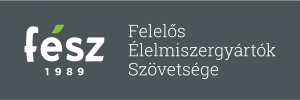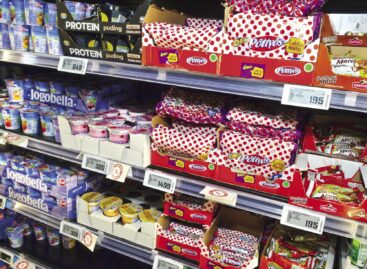Magazine: Tamás Éder: “This year will be about survival”
Tamás Éder, president of the Federation of Responsible Food Manufacturers (FÉSZ) talked to our magazine about the state of play in the food industry.

– What results did the food industry produce in 2021?

Tamás Éder
president
Federation of Responsible Food Manufacturers
– We don’t have the exact number yet, but it seems that the level of profitability was basically like in the past few years. Food companies could buy produce from farmers at 19.3% higher prices than before. At the same time domestic sales prices of the food industry only increased by 6%. This difference was partly compensated for with production efficiency.
– How big was the growth?
– In volume the production growth was nearly 9% in 2021. This could happen because of the country’s economic growth, and also due to the fact that the base in 2020 was relatively low.
– Which were the most successful sectors last year?
– According to data from the Central Statistical Office (KSH), the outputs of the meat industry and drinks production was above the average. However, this doesn’t necessarily mean that these sectors were the most profitable too.
– Which sectors had to face the biggest difficulties?
– I must mention poultry processing here: it had to cope with bird flu once again, which led to raw material shortage for many companies.
– Were there any problems in the regulatory background or in the global market that had a negative influence on the sector?
– For instance the disruption in the supply chains because of the Covid pandemic. The rapid increase in prices has also had a negative effect on food companies – energy, raw materials, packaging materials and transportation all cost much more now than before. There were no problems on the regulatory side. Sustainability became a topical issue because of the European Union’s Green Deal and Farm 2 Fork strategies. In the future we might have problems with introducing the new packaging waste management and utilisation rules. In general we can say that the Hungarian food industry is ahead of a decisive period: if we can find the place of Hungarian food companies in the sustainable food industry of the EU, then we will get the chance to close the development level gap and find new export markets.
– What did you achieve in the field of regulation?
– For many years now, the Ministry of Agriculture’s departments have had a constructive attitude towards our problems and suggestions. We think that the Hungarian Food Book’s new operating system is working very well. The food industry funding schemes of the Rural Development Programme are an absolute success, and it is a great achievement that not only SMEs but also large companies can apply for funding now.
– How are things going in the “whitening “of various food industry sectors?
– It has been going very well in the last 6-8 years, thanks to government measures such as connecting cash registers with the central system of the National Tax and Customs Administration (NAV). Those sectors whitened the most where the VAT rate – from raw material to the end product – is the lowest, 5%.
– Which are the problems that still need to be solved?
– Obviously the biggest problem is the sharp rise in production costs, in the last year and half and especially in the last two months: we should be able to offset this by selling the products we make at higher prices to partners. The other important task is to use the big funding from the EU as well as possible, realising development projects that are in line with actual market needs, so that Hungarian food companies will become more competitive.
– What activities have you got planned for 2022?
– If I may say so, this year will be about survival for food companies. Higher production costs, supply chain problems and the war in Ukraine all make life difficult. FÉSZ does its best to help member companies in this situation. We also try to promote the practical steps that can be taken in the area of sustainability. //
Related news
The Hungarian Food Book is 50 years old
🎧 Hallgasd a cikket: Lejátszás Szünet Folytatás Leállítás Nyelv: Auto…
Read more >Chemical cocktail or safe food?
🎧 Hallgasd a cikket: Lejátszás Szünet Folytatás Leállítás Nyelv: Auto…
Read more >There is a slice for everyone
🎧 Hallgasd a cikket: Lejátszás Szünet Folytatás Leállítás Nyelv: Auto…
Read more >Related news
NKFH: inspections focus on discount prices and customer deception
🎧 Hallgasd a cikket: Lejátszás Szünet Folytatás Leállítás Nyelv: Auto…
Read more >






